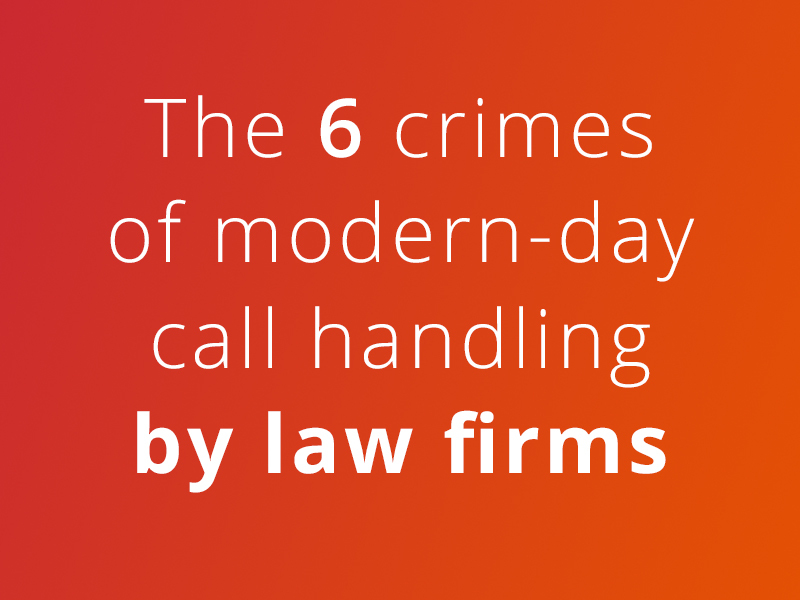
Six common ‘crimes of modern-day call handling’ are blighting UK law firms and hampering their growth, reputation, and profitability.
In this article, Moneypenny’s Head of Business Development, Claire Smith, talks you through some of the most simple, yet serious mistakes that could be having significant financial ramifications for firms to the tune of thousands of pounds per annum. Is this where your practice is going wrong?
1. Endless rings and slow response times
We typically use the phone to speed up information-gathering, decision-making or the buying process – which is why endless rings and slow response times are a serious consumer gripe.
69% of callers won’t leave a voicemail
Data reveals that 69% of callers won’t leave a voicemail, so tardy call answering and unavailable professionals will quickly turn into lost opportunities and disenfranchised, frustrated prospects.
Answer calls swiftly and don’t leave callers waiting on hold or stuck in a loop system. Avoid putting calls through to voicemail if you know someone is away from the office and instead take a message so that they’ve spoken to a person and feel confident their enquiry is valued and logged.
2. Disinterested and robotic receptionists
The culture that you’ve spent years perfecting and instilling in your workforce should shine through in your employees’ telephone manner. It all comes down to personality, yet too many firms’ front line call-handlers sound painfully scripted, unprofessional or even bored which can be an immediate turn-off.
It may sound silly, but simple things like smiling when answering the phone can make a real difference, it really comes across and makes you more engaging and friendly. It can also help to make pleasant conversation with callers. Use first names if it feels appropriate. As they say, ‘people buy from people’ so being personable is memorable and puts clients and prospects at ease.
3. Poor organisational knowledge
Most firms understand the importance of investing in regular skills training – but few include telephone answering. Call handlers that don’t know how to put calls through, who’s in the office or when they’ll be back, or even if someone has left, are all common consumer gripes about poor phone etiquette.
Call-handling should be part of the induction process and cover manner as well as the technical side of things. Call handlers need to be supported with shared diaries, organizational charts, holiday rotas, and up to date employee lists to ensure that they have the information they need to be effective and helpful.
4. Hit and miss service
When it comes to call-handling, consistency is key, yet for many practices, a ‘pool’ approach to answering calls when reception is busy, can mean the quality of service is hit-and-miss and highly dependent on who answers.
When calls are redirected to other departments during busy times it can result in less than professional, curt, and ill-informed call handling as people are interrupted from their work. It’s wise to put guidelines in place around firm-wide standards and what’s expected but better still, it really pays to have an overflow call handling service to ensure consistent quality client care when front-of-house teams are busy.
5. Unreturned calls = lost goodwill and lost leads
Taking messages is one thing, making sure they make it to the recipient is quite another and it can really erode goodwill as well as new business opportunities when it doesn’t happen properly.
If you leave a message you expect it to be returned and rightly so. When calls are cascaded to other departments, message-taking is often compromised – they might be taken but not passed on or just not taken at all. Messages should be captured accurately and passed to colleagues efficiently.
6. Answering machines at 5:30 on the dot
With voicemail proving a turn-off for callers, it’s no surprise that office switchboards being directed to the answering machine as soon as the clock hits 5:31pm is a major source of frustration.
10% of business calls take place outside working hours
10% of business calls take place outside working hours and, in a 24/7 age, it’s particularly frustrating for consumers if they can’t reach firms when it suits them. By investing in telephone answering support, law firms can rest assured that every enquiry and lead will be captured, whatever time of day. Whether the service is used to deal with overflow calls that front-of-house staff aren’t able to answer, out-of-hours enquiries or the entire telephone function, the possible return on investment is huge – with a third more enquires handled in some cases.
For firms trying to make incremental improvements to their operations, efficiency and client care, the benefits of sharpening up internal systems, setting standards, maximising the use of technology, and investing in extra support are compelling.
By mastering the art of call handling, firms can maximise their calls and boost their bottom-line in the process. With the right support, telephone communication can be transformed into a vital tool to improve the client experience, drive revenue and get ahead of the competition.
Discover more
Find out more about our legal answering service and discover the benefits we deliver to over 1,000 legal practices across the UK. Call us on 0333 202 1005 to get your quote today.
Your own PA to look after calls, qualify leads, book appointments, and lots more.
Discover >Our team of PAs capturing every new enquiry and qualifying them during the call.
Discover >